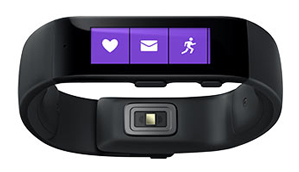Do you wear a fitness tracker like a Fitbit or a Jawbone? Or maybe you are planning to jump on the Apple Watch fanboy train in a few weeks and take advantage of that device's ability to track your activity. Lot's of folks are keeping closer track of their workouts and activity today.
A few months back Microsoft launched its first entry into the wearables market with the Microsoft Band, a wearable tracker that possesses a variety of sensors including a microphone, a GPS location sensor, motion sensors, an optical sensor that measures heart rate, a sensor that tracks skin conductance, which can reveal levels of stress, and even a UV sensor to calculate sun exposure, delivered in a black bracelet with a rectangular touch screen.
At that time, your humble blogger, (me), shared some thoughts about why this particular wearable smart device could be the one that has the greatest potential for near-term impact and relevance to work, workplaces, and employees. Namely, because Microsoft has such a choke hold on most organization's email, calendaring, and document management that it would be both natural and powerful for a Microsoft wearable to be integrated with these existing and traditional workplace tools.
You can read my entire take here, but at the risk of getting too meta and quoting myself, below is the gist of my argument back in October 2014:
I can think of a couple of really compelling use cases for this kind of integration right off the top.
One - how work itself effects employee health. Does someone's heart start racing in every staff meeting? Do they begin to get twitchy when called upon to present to a group? Does a certain interaction with a colleague result in three nights of poor sleep? And then what can organizations then do to better understand and potentially align individuals with projects and team members that can aid their ability to perform, while not making them crazy? How do schedules, (and in particular over scheduling), impact employee health and activity? Do we need to be more mindful of how overworked and over scheduled many of our people are?
Two - Insights into who in the organization inspires, challenges, and lifts people up, and who serves as essentially the corporate buzzkill? Imaging a meeting with 10 people inside, all wearing the MS Band. One person dominates the meeting, maybe it is the boss, and immediately after the other 9 people begin to show signals of nervousness, irritability, or even lethargy. Maybe email and collaboration patterns in the team begin to show signs of changing as well. Perhaps some members of the team skip their normal workouts for a day or two in the aftermath. Maybe some folks don't even turn up the next day.
Clever stuff, right? Why bring that back up again today? Well, check the comments from a recent piece from a few days ago that was posted on the MIT Technology Review site - Microsoft's Wristband Would Like To BE Your Life Coach:
During a recent interview at Microsoft’s Redmond, Washington, headquarters, Matt Barlow, general manager of marketing for new devices, said the company is investigating the kinds of insights it can share with users by matching up biometric data with other sources of information like their calendar or contacts to show things like which events or people may stress them out.
In the coming months, the Microsoft Health app is poised to gain the ability to compare calendar or contact information with your physical state as measured by the band—your heart rate or skin conductance level, for instance—so the app could nudge you with detailed observations about how those things might relate. For instance, the app might send you an alert like, “I noticed you have a meeting with Susan tomorrow, and last time you met with her your heart rate went up 20 beats per minute and stayed elevated for an hour. How about trying this deep-breathing exercise that you can use with the Band?”
Initially, these kinds of scenarios are expected to become possible through an integration with Microsoft Office services, though over time it may branch out to include other services as well.
Hey - the Microsoft dude is essentially touting the same kinds of capability and interesting workplace data integrations that little old me talked about in October. But not to say I told you so...
But the real point of resurfacing the old post and topic was just to remind you that even though wearables and fitness trackers have been around for a while now, we really are just still in the first inning of a long game. Trackers and biological/physiological sensors won't really start impacting the way work gets done until they actually are integrated with the tools of work - email, calendars, meetings, etc.
Stay tuned...
Have a great week!